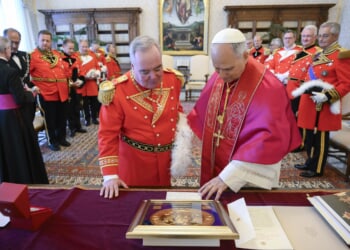Op-ed views and opinions expressed are solely those of the author.
On June 28, 1776, a procession of British Warships and troop transports, under the command of Admiral Richard Howe, began arriving in New York Harbor. Day after day thereafter, more and more ships arrived, accumulating into the largest naval force the British Empire ever assembled: 500 ships, carrying 32,000 troops dedicated to destroying a rebellion in the American colonies. Admiral Howe thought his forces so overwhelming to the eye that he was confident of a rebel surrender when he sent a last petition to the American commander: that if the rebels laid down their arms, they would be granted the King’s pardon. General Washington sent a message back: “Those who have committed no fault, want no pardon.”
The Second Continental Congress had assembled some months before in Philadelphia, and the colonials determined on naming a military commander of a Continental Army; on the colonies developing their own distinct constitutions; and on writing an official document separating the colonies from English rule. The military commander was George Washington, and the document became The Declaration of Independence.
A committee comprised of Benjamin Franklin, John Adams, Robert Livingston, Roger Sherman and Thomas Jefferson was charged with composing the document. Jefferson did the majority of the writing, taking 17 days to accomplish the task, with the fullest knowledge of its historical importance.
The Declaration begins: “When in the Course of human events, it becomes necessary for one people to dissolve the political bands which have connected them with another, and to assume among the powers of the earth, the separate and equal station to which the Laws of Nature and of Nature’s God entitle them, a decent respect to the opinions of mankind requires that they should declare the causes which impel them to the separation.”
“We hold these truths to be self-evident, that all men are created equal, that they are endowed by their Creator with certain unalienable Rights, that among these are Life, Liberty and the pursuit of Happiness.–That to secure these rights, Governments are instituted among Men, deriving their just powers from the consent of the governed, –That whenever any Form of Government becomes destructive of these ends, it is the Right of the People to alter or to abolish it, and to institute new Government, laying its foundation on such principles and organizing its powers in such form, as to them shall seem most likely to effect their Safety and Happiness.”
Among the causes for the separation are listed:
He (the present King) has refused his Assent to Laws, the most wholesome and necessary for the public good.”
“He has forbidden his Governors to pass Laws of immediate and pressing importance.”
“He has erected a multitude of New Offices and sent hither swarms of Officers to harass our people and eat out their substance.”
“For taking away our Charters, abolishing our most valuable Laws, and altering fundamentally the Forms of our Governments.”
The Declaration ends: “for the support of this Declaration, with a firm reliance on the protection of divine Providence, we mutually pledge to each other our Lives, our Fortunes and our sacred Honor.”
On July 19th, General Washington had the Declaration read to the entire Continental Army, then surrounded by the preeminent Army and Navy of the world, while attempting to defend a harbor, without a navy. Washington wanted his men to know they were fighting on the front lines of an eternal war for the natural, God given, inalienable rights of humanity.
The battle that ensued was a rout of the American forces, who were enveloped on the Guwanus Heights of Long Island. When his left flank broke, American General William Stirling ordered every regiment of his command to retreat, except one: Mordecai Gist’s 1st Maryland, which Gist had recruited, trained, and equipped – was ordered to charge!
With the words of the Declaration still echoing in their ears, among cannon and musket blasts, Gist’s 1st Maryland, 270 strong, charged 2,000 of best trained, entrenched Scot’s Highlanders in the British Army – and drove them back. Gist recovered his men and attacked again, to cover the Continental Army’s retreat. At the end of the day, Mordecai and eight of his men remained alive, having helped the Continental Army survive. In the end, that charge and the valorous sacrifice of 261 Marylanders allowed 9,000 members of Washington’s army to survive through a tactical retreat, during the worst military disaster of the new nation; more importantly, the words of our founding Declaration of Independence for which they died survived.
The Declaration was read throughout the states of a new nation, it accompanied the soldiers in their victory in Saratoga, and in their defeat, when the capital city of Philadelphia was captured by General William Howe, and the new Congress itself was sent into exile…When Benjamin Franklin heard the news in Paris, he exulted: “Howe has not taken Philadelphia, Philadelphia has taken Howe!”
Franklin understood the revolution wasn’t in the capital, it was in the words of the Declaration of Independence and that survived.
The Declaration was read through the winter at Valley Forge and ultimately at the revolutionary victory of Yorktown. And like the soldiers and new citizens of that war, we should hold the Declaration of Independence forth as a work of glory in the eternal war for the common rights, the common laws and the common freedoms of the United States.
DONATE TO BIZPAC REVIEW
Please help us! If you are fed up with letting radical big tech execs, phony fact-checkers, tyrannical liberals and a lying mainstream media have unprecedented power over your news please consider making a donation to BPR to help us fight them. Now is the time. Truth has never been more critical!
Success! Thank you for donating. Please share BPR content to help combat the lies.
We have no tolerance for comments containing violence, racism, profanity, vulgarity, doxing, or discourteous behavior. Thank you for partnering with us to maintain fruitful conversation.










![Florida Man With Violent History Arrested for Choking a Cop [WATCH]](https://www.right2024.com/wp-content/uploads/2025/06/Eleven-Stabbed-in-Attack-at-Salem-Homeless-Shelter-Across-From-350x250.jpg)







